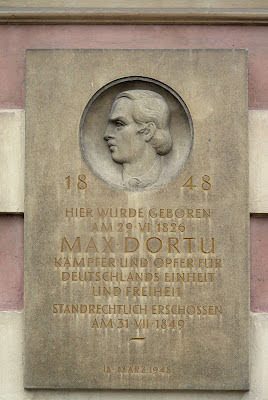
|
| Dortu mausoleum at the old Wiehre cemetery |

|
|
Dortu's parents' house on Dortustraße in Potsdam. Destroyed during
the war, the former GDR had the building restored to its original state for propaganda reasons. It served and still serves as a primary school. I took this and the following photo during my recent visit to Potsdam. |

|
| Commemorative plaque on Dortu's parents' house |
Dortu coined the nickname Kartätschenprinz for Wilhelm, who used this lethal weapon during the March 1848 uprisings against the people of Berlin. This is the same guy who, in 1871, became Kaiser Wilhelm upon Germany's unification into the Second Reich.
Being sought for acts of sabotage, Dortu fled Prussia and subsequently joined the still-active revolutionary movement in Baden in 1849. He even rose to the rank of Major in the revolutionary army at the age of 23. When the Prussian intervention army eventually got hold of him in Freiburg, they charged him with high treason and sentenced him to death. In the early hours of July 31, 1849, he died at the Wiehre cemetery in front of a firing squad.

|
|
Brothers, aim well! I die full of joy and courage, for I fought for the nation's liberation. |

|
|
Red Baron was there in his red Madison revolutionary T-shirt. A good friend of mine, the organizer of the yearly commemoration, took the picture. |
I met up with 2 of the Wisconsin 14, I also had a gift of a Rockford Sock Monkey symbolizing the City of Rockford, Illinois where they held out. Interesting Blog, Thanks
ReplyDelete